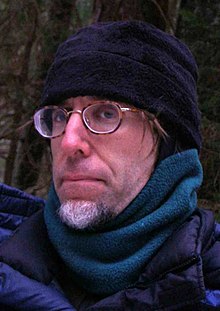David Abram

David Abram (born June 24, 1957 on Long Island , New York ) is an American cultural ecologist , philosopher and author. His book The Spell of the Sensuous had a major impact on the American ecological movement. He is the founder and director of the Alliance for Wild Ethics. He lives in New Mexico .
Life
He grew up in Long Island and studied at Wesleyan University. After his studies he lived with shamans in Indonesia, Nepal and America. In 1993 he received his PhD from the State University of New York .
plant
Abram's work deals with the phenomenology of perception, the roots of the ecological crisis, the alienation of modern humans with western and occidental influences and the participatory perception of nature by oral-indignant peoples. His work was significantly influenced by the phenomenology of Maurice Merleau-Pontys and the Gaia hypothesis of James Lovelock ; other influences are Edmund Husserl , Martin Heidegger and Ivan Illich .
effect
His multi-award-winning book The Spell of the Sensuous had a lasting impact on the ecological movement in the USA. The Utne Reader lists him as one of the visionaries changing the world today. The German biologist and philosopher Andreas Weber referred to The Spell of the Sensuous in his book Everything feels as a "milestone".
Works (selection)
Books
-
The Spell of the Sensuous. Perception and Language in a More-Than-Human World . Vintage Books, New York 1996.
- Under the spell of sensual nature. The art of perception and the more-than-human world . thinkOya, Klein Jasedow 2012.
- Becoming Animal. To Earthly Cosmology . Pantheon 2010.
Essays
-
The Perceptual Implications of Gaia . In: The Ecologist, vol. 15, issue 3 (1985)
- Surrounded by Gaia . In: Hagia Chora , 15 (2003)
-
Earth Stories . In: Resurgence , 222 (2004)
- Earth stories . In: Oya , 15 (2012)
- Earth in Eclipse. An Essay on the Philosophy of Science and Ethics . In: Suzanne L. Cataldi & William S. Hamrick (Eds.): Merleau-Ponty and Environmental Philosophy . SUNY Press, Albany 2007
Web links
Individual evidence
- ↑ 100 Visionaries , in: Utne Reader , Jan / Feb 1995.
- ↑ Quotation: “Abram makes a journey that reaches from the German philosophy of the early 20th century to the thinking of indigenous American peoples. A milestone. "(Andreas Weber: Everything feels . BTV, Berlin 2008, p. 332)
| personal data | |
|---|---|
| SURNAME | Abram, David |
| BRIEF DESCRIPTION | American cultural ecologist, philosopher, and author |
| DATE OF BIRTH | June 24, 1957 |
| PLACE OF BIRTH | on Long Island , New York |